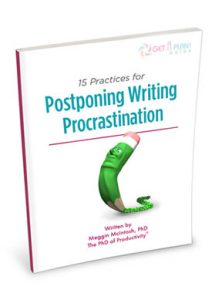Productive Habits to Get Your Writing Done by Christine Whitmarsh
 It can be a Catch 22. Writers are, by nature, fueled by idea storms, microbursts of creativity, and lightning bolts of inspiration. The problem with living in a psychological Weather Channel is that it can be difficult to get any actual writing done! What are the secrets of harnessing all of nature’s creative fury in a productive way and getting your writing projects done? Let’s look at 10 specific strategies for getting started on your next writing project and locking in the productive habits to get it done!
It can be a Catch 22. Writers are, by nature, fueled by idea storms, microbursts of creativity, and lightning bolts of inspiration. The problem with living in a psychological Weather Channel is that it can be difficult to get any actual writing done! What are the secrets of harnessing all of nature’s creative fury in a productive way and getting your writing projects done? Let’s look at 10 specific strategies for getting started on your next writing project and locking in the productive habits to get it done!
- Switch Gears In our hyper-connected, constantly plugged in world, the struggle to focus is real for writers. This is why it’s important to acknowledge two key settings in your brain – proactive and reactive, and then act accordingly. Answering email, mingling around social media, and web surfing, are all reactive activities – you’re in constant reactive mode to conversations and situations. Writing, however, is creating, which is a proactive activity – you are initiating it. Therefore, when it is time to sit down and write, it’s important to provide a buffer zone to allow your brain to go from reactive to proactive. This could mean going offline and simply stepping away from your computer for a few minutes to get a cup of coffee, or taking a walk, doing some yoga, or changing your choice of music – anything that triggers the message in your brain that it’s time to stop receiving data and start creating it.
- Enter Your Cave As a longtime professional writer I came up with the term “writing cave” years ago, to describe the mental state I enter where creativity can flow uninterrupted, ideas can be produced into reality and, from a career standpoint, client books can actually be completed. You are free to adapt this idea however you please; whether it’s merely a mental state or you choose to actually designate a physical location as your “writing cave” – the place where you are at your most inspired and productive. If you do end up constructing an actual writing cave, please do me a favor and email me a photo at christine@christine-ink.com. That would be pretty awesome to share!
 Organize Your Thoughts It’s pretty common for new writers to be so intent on getting the job done that they plop right down at their desk, open up that blank white computer screen, all fired up to write and then…. nothing. Now you’re completely freaking out, unable to come up with a single word to type. The blank white screen is mocking you. This is happening because all those ideas floating around your head for your writing project are now trying to crowd through a mental doorway, and they’re stuck. My big tip for combatting this type of creative brain paralysis is to organize your thoughts first. Jot down notes, outline, scribble down bullet points – whatever you can do to pour all those disorganized ideas onto the page and organize your thoughts ahead of time. Clear the mental doorway so the good stuff can flow through!
Organize Your Thoughts It’s pretty common for new writers to be so intent on getting the job done that they plop right down at their desk, open up that blank white computer screen, all fired up to write and then…. nothing. Now you’re completely freaking out, unable to come up with a single word to type. The blank white screen is mocking you. This is happening because all those ideas floating around your head for your writing project are now trying to crowd through a mental doorway, and they’re stuck. My big tip for combatting this type of creative brain paralysis is to organize your thoughts first. Jot down notes, outline, scribble down bullet points – whatever you can do to pour all those disorganized ideas onto the page and organize your thoughts ahead of time. Clear the mental doorway so the good stuff can flow through!
- Break It Down Newsflash: The giant chunk of time you’ve been hoping for, where you can “finally” get all your writing done, does not exist. The mythical cabin in the woods where you’ve been planning on writing the great American novel, burned down. All you’ve got is the time you have. The good news is that you are 100% in control of this time! Rather than continuing to wait for the big block of time to open up, it’s far more effective to find smaller, more realistic blocks of time. Can you set a timer for 10 minutes a night and ONLY write during that time? Or perhaps the only block of time you consistently have open is every Saturday between 12pm and 2pm? Look at your schedule with an open mind, see what IS possible, and then block that time off. There’s no block of time to small; every minute moves you closer to completion!
- Fiercely Protect Your Writing Time Once you have blocked off your weekly writing time, protect it like you would your firstborn child. Schedule it, lock it in, and shield it from excuses at all costs. Treat it like you would THE most important appointment imaginable, where the consequence for cancelling would be severe.
- Write Drunk, Edit Sober This is a quote frequently (but incorrectly) attributed to Ernest Hemingway, but liquor aside, there is a useful concept here. Treat first drafts like massive brain dumps and get all your ideas on the page, without editing. I’ll say that again – no editing allowed. No self-judgment allowed. No kicking yourself, banging your head against the wall, or throwing your cat at the window in frustration for what you feel is unbelievable garbage that you’re writing. Keep going until you have a comprehensive rough draft of your piece with a beginning, middle, and end. THEN you have my permission to go back and edit. No cat throwing though; ever.
- Find YOUR Process This might seem ironic, since here I am giving you all my best strategies, but it’s very important to find the process that works for you. Whether this means writing at your desk, in your hammock, indoors, outdoors, this coffee house or that one, mornings, afternoons, or nights, explore various productivity patterns until you find the one that yields the best results. Disclaimer: This is not a get out of jail free card to go on a six-month procrastination odyssey!
 Measure Your Attention Span While you’re finding your best productivity process, take note of how long your brain operates at peak creative performance in any given writing session. Look this up online and you’ll find all sorts of suggestions from other writers. I would encourage you to use those findings as benchmarks and then take note of your own attention span – the space where writing quality, inspiration and ideas, and mental energy come together. Once you’ve determined that number, I recommend setting a timer during your writing time to make sure you don’t exceed it (and go into the mental “ick” space where you’re running on creative fumes).
Measure Your Attention Span While you’re finding your best productivity process, take note of how long your brain operates at peak creative performance in any given writing session. Look this up online and you’ll find all sorts of suggestions from other writers. I would encourage you to use those findings as benchmarks and then take note of your own attention span – the space where writing quality, inspiration and ideas, and mental energy come together. Once you’ve determined that number, I recommend setting a timer during your writing time to make sure you don’t exceed it (and go into the mental “ick” space where you’re running on creative fumes).
- End at a Good Starting Point Make it as easy as possible for your future self to dive back into your writing project, by forcing yourself to stop in the middle of a creative roll. This might sound slightly sadistic – “Wow, I’m really cooking with gas here! I’m writing some AWESOME stuff! And… STOP.” Trust me, if you can find a stopping place in the middle of a roll, it will be that much easier to get started again after your lunch break.
- Push Through the Terror The ability to write is a talent, a responsibility (to your readers) and a privilege (that you can do it and so many others cannot). It’s especially important to remember all this when writing is hard. Anything worth doing is occasionally hard to do. Sometimes it’s easy, sometimes it’s fun, sometimes it’s hard, and sometimes it just plain sucks. Do it anyway. Trust me, the hard parts will always pass. Stick with your strategies, picture your readers, believe in your talent, and above all – keep writing.
Bestselling celebrity ghostwriter Christine Whitmarsh helps people write books that make a difference! She does this through her agency’s book development, coaching, ghostwriting, and book marketing services. She can be contacted at christine@christine-ink.com.
 Do you know any writers who procrastinate? Could that writer actually be you? We writers know perfectly well that we procrastinate, sometimes in very clever ways. In need of tips to help you stop? You’ll want the Get a Plan! Guide® to Postponing Writing Procrastination, part of the Get a Plan! Guides® series.
Do you know any writers who procrastinate? Could that writer actually be you? We writers know perfectly well that we procrastinate, sometimes in very clever ways. In need of tips to help you stop? You’ll want the Get a Plan! Guide® to Postponing Writing Procrastination, part of the Get a Plan! Guides® series.
Inside, you’ll find 15 practices to postpone your writing procrastination. You’ll receive the ideas and inspiration to do your work easier, faster, and in a more focused fashion.




